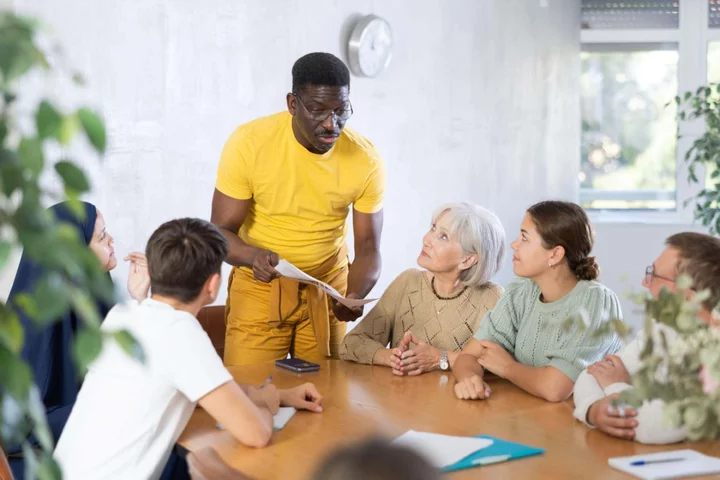
Taking adult education classes may lower risk of dementia, study suggests
Taking an adult education class could help lower your risk of developing dementia, researchers have found. Middle-aged and senior citizens in adult education have a 19% reduced chance of developing the condition within five years, a new study suggests. The findings also suggest that people who took the classes kept up their fluid intelligence – the ability to reason quickly and to think abstractly – and non-verbal reasoning performance better than peers who did not. First author Dr Hikaru Takeuchi, of Tohoku University in Sendai, Japan, said: “Here we show that people who take adult education classes have a lower risk of developing dementia five years later. “Adult education is likewise associated with better preservation of non-verbal reasoning with increasing age.” Here we show that people who take adult education classes have a lower risk of developing dementia five years later Dr Hikaru Takeuchi, Tohoku University Dr Takeuchi and his co-author Dr Ryuta Kawashima, also a professor at the Institute of Development, Ageing and Cancer at the university, analysed data from 282,421 people in the UK Biobank, which holds genetic, health, and medical information from approximately half a million British volunteers, They had enrolled between 2006 and 2010, when they were between 40 and 69, and had been followed up for an average of seven years at the time of the new study. Based on their DNA, people were given an individual predictive risk score for dementia, and self-reported if they took any adult education classes, without specifying the frequency, subject, or academic level. The study looked at data from the enrolment visit and third assessment visit, between 2014 and 2018. Those enrolled in the study were given psychological and cognitive tests, for example for fluid intelligence, visuospatial memory and reaction time. According to the study published in Frontiers in Aging Neuroscience, 1.1% of people in the sample developed dementia over the course of the study. It also found that people who were taking part in adult education, at enrolment had 19% lower risk of developing dementia than participants who did not. The results were similar when people with a history of diabetes, high cholesterol, cardiovascular diseases, cancer or mental illness were excluded. The researchers suggest this means the observed lower risk was not exclusively due to people with developing dementia being prevented from following adult education by symptoms of these known conditions. Dr Kawashima said: “One possibility is that engaging in intellectual activities has positive results on the nervous system, which in turn may prevent dementia. “But ours is an observational longitudinal study, so if a direct causal relationship exists between adult education and a lower risk of dementia, it could be in either direction.” Read More Charity boss speaks out over ‘traumatic’ encounter with royal aide Ukraine war’s heaviest fight rages in east - follow live Indiyah Polack: I didn’t want to go on Love Island because of my acne Everything you need to know about the UK’s first womb transplant Why are wellbeing experts concerned about the ‘lazy girl job’ trend?
2023-08-23 17:57
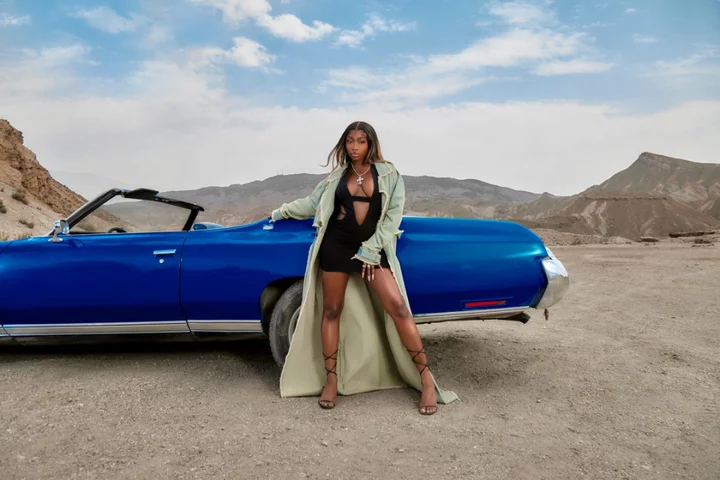
Indiyah Polack: I didn’t want to go on Love Island because of my acne
When Indiyah Polack got the call to go on the eighth season of ITV2’s Love Island in 2022, she had just had another bad acne breakout. “I didn’t want to go on the show anymore because of it,” the 24-year-old admits. “But then I really thought about it, I did my interviews and spoke to the producers, and they loved me. “I had to tell myself, ‘Well, Indiyah, they didn’t love you for your skin but your personality. I guess they want you for you. So don’t let it get to you. Your skin doesn’t define you’. This was how I started looking at it.” Polack ended the show in third place with Dami Hope – and the pair are still together. Since then, the former waitress has gone on to present Love Island: The Morning After Podcast with Sam Thompson and ITV2’s Love Island: Aftersun, alongside Maya Jama. “Imagine if I didn’t go on Love Island, I probably wouldn’t be in this position now, having this conversation,” she says. “We can’t let superficial things get us down.” Polack says she has always struggled with her skin. Growing up, her acne “definitely affected my confidence but I’ve got to the point where I’ve been living with it for so long. I don’t think anything is ‘bad skin’. Skin is skin. You either have spots or you don’t. “And as I’ve gotten older, I’ve started to think more about whether I would be in this position if I didn’t have acne. I know it’s a weird way to look at it, but I just think my skin makes me who I am. When I meet people, whether they like me or not, they don’t not like me because I have ‘terrible skin’.” As a result, skincare has become such a big part of Polack’s life. She has a morning and night time routine which can “get quite tiresome and hard to keep up with, especially during busy periods”, she says. “ I usually stick to five steps and make sure I wash my face, cleanse, moisturise, use SPF and then squalene.” Polack became a marketplace ambassador for PrettyLittleThing and has launched a new collection, designed with Chris Parnell, the fashion retailer’s head of design. The collection includes a range of mini dresses, cargos, corsets, and edgy co-ords, which Polack says will take you from day-to-night. There are added details like chunky buckles, lace ties, cut-out detailing, mesh and PU leather. But a statement denim trench coat with an exaggerated train, that Polack “fought long and hard for” is one of her favourite pieces. “I don’t think people really realise how much actually goes into designing a collection, there’s a lot of trial and error. There are a lot of fittings, reworking things, and making sure you’re happy with the quality of the materials,” she says. It was inspired by festival season and her own sense of style instead of ever-changing fashion trends. “I would say my personal style is sexy, chic, a bit cool, a bit amazing – no, I’m joking. I take a lot of inspiration from Rihanna. I love how she’s so effortless. And she does wear a few streetwear outfits and still looks sexy. That’s how I want people to feel in my collection.” Polack didn’t always dress the way that she does now, though. She still can’t really put her fashion style under one umbrella, but went through a lot of phases, including punk rock, where she says she would wear whatever made her happy and put chains on everything. The TV presenter’s relationship with her hair has drastically changed, too. Polack was first introduced to the nation on the reality dating game show, with her skunk stripes hair pulled back into a high ponytail (her go-to style) with flicked ends, another term for a two-tone hair colour where there is a contrast of a darker hue next to very light blonde. “Hair is just hair, so I don’t hold it as close to me,” she says. “When I went into the Love Island villa, I had tape-ins, as they were the most convenient hairstyle for me at the time. I have afro curly hair, so it would be very hard to maintain things like a wig in the heat. “But my hair got really damaged by the tape-ins. When I came out of the villa, my hair was so short, dry, and broken. I actually couldn’t get my hair in a bun and people – who can be so fickle at times – had so much to say about it in my comments. It’s going to grow back. But I feel like I have a good relationship with my hair now. It’s moisturised, I can tell you that. We’ve not got as many split ends.” Ironically, there was a time in Polack’s life where she hated putting her hair in a ponytail or bun. She felt like it made her look too young and didn’t want to look like a teenager but now she says, “it’s like a free face lift. I like it”. Skunk stripes are “the most subtle hairstyle” she’s done. “I used to dye my hair all the time. I’ve been every colour under the sun. When I was in sixth form, I used to rock a hot pink afro.” Was she allowed? “I wasn’t but I did it,” Polack says. “My hair was bleach blonde [at one point]. I went to a girls’ school and they were quite strict – no crazy hairstyles were allowed. They told me that I wouldn’t be able to go into my exam hall with my hair that way, but I was like, ‘Well I am, and I’m going to get an A*’.” It helps that the content creator believes everything is an assimilation. “ I do believe that nothing is that serious. I think going into the Love Island villa has changed me, and I don’t know if that’s for better or worse,” she says, with a laugh. “I just believe anything in your life can happen. I’m so blessed to be in this position and meet amazing people. It takes confidence and knowing what you really want. I’m a big believer of the law of attraction. If you ask, you will get it.“The only caveat is, you need to be grateful for everything you already have.” Shop Polack’s latest PrettyLittleThing collection at prettylittlething.com
2023-08-23 17:28
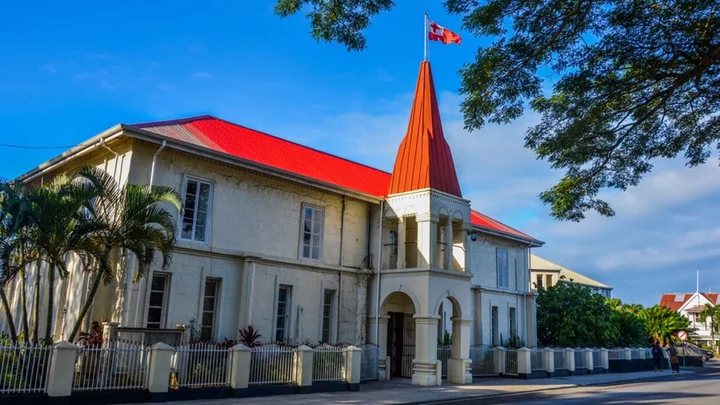
Tonga media guide
An overview of the media in Tonga, including links to broadcasters and newspapers.
2023-08-23 16:50
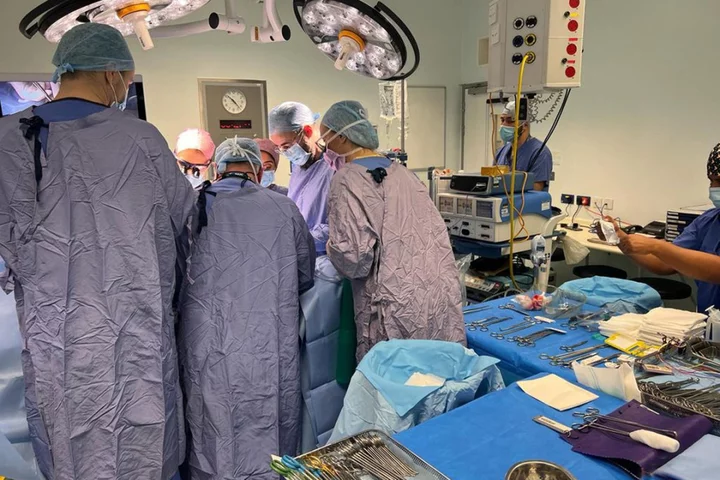
Everything you need to know about the UK’s first womb transplant
The UK’s first womb transplant means that, in future, dozens of women born without a functioning organ can carry babies of their own. – What has happened? Surgeons have performed the UK’s first womb transplant on a 34-year-old woman whose older sister donated the organ to her. In a complex procedure, the medical team removed the womb from the 40-year-old woman and implanted it directly into her sister. Both women have made a good recovery. – Have any babies been born? Not yet. Experts want to be sure the transplant is stable and the womb is functioning fully before the younger woman undergoes IVF. She has stored eight embryos and will have fertility treatment later this year in central London. The woman hopes to have more than one baby. Once she has completed her family, the womb will be removed to prevent her needing immunosuppressant drugs for the rest of her life. – Has the NHS paid for the operation? No. Each womb transplant costs around £25,000 and is fully funded by the charity Womb Transplant UK. This includes payment to the NHS for theatre time and the patient’s stay on a ward. The operations are only carried out at times when the NHS is not using the operating theatre, so they do not impact on usual NHS waiting lists. Surgeons and medical staff involved in the transplant have not been paid for the operation and have given their time freely. – Have other womb transplants been carried out around the world? More than 90 womb transplants have been carried out internationally, with most operations involving a living donor. The first successful womb transplant took place in Sweden in 2014, with the baby – Vincent – born to a 36-year-old woman who described him as “perfect”. In 2000, a transplant was performed on a 26-year-old woman in Saudi Arabia but the donor womb survived for only 99 days due to problems with its blood supply. To date, womb transplants have been carried out in more than 10 countries, including Saudi Arabia, Turkey, Sweden, the US, China, Czech Republic, Brazil, Germany, Serbia and India. – How successful is the operation? Data from the US shows that more than half of women who received a womb through a transplant in the US went on to have successful pregnancies. Between 2016 and 2021, 33 women received womb transplants in the US and, as of last summer, 19 of them (58%) had delivered a total of 21 babies. In 74% of those receiving a womb, the organ was still functioning one year after transplant and 83% of this group had live-born children. – Will there be more transplants in the UK? Yes. The second British womb transplant is scheduled to take place this autumn and experts believe a maximum of 20 to 30 per year could be carried out in the UK in the future. Transplants could help women born without a functioning womb and those who lose their organ to cancer or other conditions. Estimates suggest there are 15,000 women in the UK of childbearing age who do not have a functioning womb. – Will there be a shortage of donor wombs? Womb Transplant UK is running two programmes, one involving living donors and another with organs from people who have died. The living donor programme in the UK has so far focused on women with relatives who are willing to give their wombs. However, the team believes that in the future, the living donor programme will expand to include friends or altruistic living donors. This is currently more common in the US. The use of deceased donors is assessed by the team on a case-by-case basis. Read More Charity boss speaks out over ‘traumatic’ encounter with royal aide Ukraine war’s heaviest fight rages in east - follow live Why are wellbeing experts concerned about the ‘lazy girl job’ trend? How to check for cancer, as Morrisons puts NHS cancer advice in underwear labels Prostate screening ‘could save lives’ – the symptoms and risk factors you need to know
2023-08-23 15:45

Chandrayaan-3: India's Moon lander Vikram aims for historic lunar south pole landing
India is attempting to make history by landing Chandrayaan-3 near the Moon's little-explored south pole.
2023-08-23 09:21

6 Legendary Beings Who Haunt America’s National Parks
The parks offer thrill seekers, ghost hunters, and the brave alike another reason to visit.
2023-08-23 06:21

Rumer Willis reveals her daughter’s name was inspired by typo in a text
Rumer Willis has revealed that the name for her daughter, who she welcomed in April, was actually inspired by a text typo. The actress, 35, spoke candidly about her daughter, who she shares with boyfriend Derek Richard Thomas, during a recent interview with People. Willis went on to explain that while her daughter goes by Louetta, that wasn’t the name that she and Thomas had initially planned. “We were thinking about the name Loretta, and it was a typo,” she said. “Her dad and I were texting, and he left the ‘R’ out of Loretta, and it was just Louetta.” Willis - the daughter of Bruce Willis and Demi Moore - added that, after her partner made the typo in his text, she came to realise that she liked the name “Louetta” better than “Loretta”. “I was like: ‘Oh, I love that!’ I feel like it was one of those kind of divine intervention universe moments, and we figured it out actually quite early in my pregnancy,” she explained. However, according to The House Bunny star, she initially had a few concerns about if the name would be the best fit for her daughter. “What was scary was, I love this name, but oh man, is it going to be her name? Is it the right name?” she continued. What if she comes out and doesn’t look like this?” Despite her mixed feelings about the name during her pregnancy, Willis said she realised that she wanted to call her baby “Lou” once she was born. “I fell in love with the name so much, so early on, that I was then worried that it wouldn’t work,” she said. “But then she came out, and I mean, to me, at least right now, I was going to name her Lou, whether she was a boy or a girl.” She also added that both she and Thomas wanted to pick a name that had some “versatility” to it, before describing some of the different nicknames that her daughter could choose to go by. “If she doesn’t feel like a Louetta, she can go by Lou, she can go by Etta,” she said. “She can go change it up throughout her life. Whatever she wants.” Earlier this year, Willis took to Instagram to announce the birth of her first child. “Louetta Isley Thomas Willis. You are pure magic,” she wrote in the caption, alongside a snap of her then-newborn. “Born at home on Tuesday April 18th. You are more than we ever dreamed of.” Along with opening up about her baby’s name, Willis has also taken to social media to speak candidly about her experiences as a mother. Earlier this week, she hit back at criticism on Instagram after she shared a photo of herself breastfeeding her daughter. When Instagram users questioned her for sharing the selfie, with claims that she posted it “for attention,” the actress expressed how she viewed the ability to feed her daughter as a “privilege,” and accused critics of holding “a limited view of” breastfeeding. She continued defending her decision to post the photo, explaining how she wanted it to lessen the “shame” that women face. “I think it’s incredibly important to share because there is an incredible amount of shame that comes with being born into a female body,” Willis wrote. “And I want to lead by example in teaching my daughter that she doesn’t have to be ashamed of her body ever and that she can decide how she wants to share it.” Read More Rumer Willis shuts down criticism over breastfeeding photo with her child: ‘I am the happiest I have been’ Rumer Willis says she is ‘grateful’ to her body following birth of daughter Bruce Willis’ wife Emma Heming Willis says she is ‘not good’ amid his ongoing struggle with dementia Rumer Willis addresses criticism over breastfeeding photo with her child Rumer Willis says she is ‘grateful’ to her body following birth of daughter Serena Williams welcomes her second child with husband Alexis Ohanian
2023-08-23 05:20

Serena Williams welcomes her second child with husband Alexis Ohanian: ‘Beautiful angel’
Serena Williams and husband Alexis Ohanian are officially the parents of two. Williams, 41, shared a video to TikTok on 22 August to announce the arrival of her second child. The one-minute video started off with Ohanian looking at a computer and sitting at a table, before his wife sat down next to him. The pair were then joined by their five-year-old daughter Olympia. The video went on to show Williams leaving the room, before she returned with her newborn baby in her arms. After the tennis star exchanged a kiss with her husband, Olympia leaned toward them to give her little sister a kiss on the forehead. The clip ended with a few sweet snaps of the now family of four. In the caption of the video, which was set to Bazzi and Camila Cabello’s hit song, “Beautiful”, Williams wrote: “Welcome my beautiful angel.” Ohanian also shared a photo of himself and his family on Instagram to announce the baby news, revealing his child’s name: Adira River Ohanian. He continued the caption of his post by expressing his gratitude for his second daughter and wife, along with the doctors who cared for them. “I’m grateful to report our house is teaming with love: a happy & healthy newborn girl and happy & healthy mama,” he wrote. “Feeling grateful. @serenawilliams you’ve now given me another incomparable gift - you’re the GMOAT. Thanks to all the amazing medical staff who took care of my wife & our daughter,” he wrote. “I’ll never forget the moment I introduced @olympiaohanian to her baby sister.” In the comments, many fans and famous faces went on to celebrate the newest addition to Ohanian family. “Congratulations!!!! Such a beautiful family. I’m so happy for you guys!!!!!!,” LaLa Anthony wrote, while another fan added: “Congratulations on your beautiful baby girl! Such a beautiful family! I love her name.” A third commented: “Such a blessing! So happy for you both.” During the Met Gala earlier this year, the Grand Slam winner first revealed that she was expecting her second child. As she walked the red carpet alongside her husband in May, Williams showcased her baby bump in a black long-sleeves dress with a deep neckline and a white tulle skirt. She also celebrated the news on Instagram at the time, writing: “Was so excited when Anna Wintour invited the three of us to the Met Gala.” Earlier this month, Williams and Ohanian also shared that they had an adventure-themed gender reveal party to unveil the sex of their baby. In a video shared to the tennis star’s YouTube account, which documented the “baby shower slash gender reveal” event, Ohanian had arranged for a drone display in the sky to reveal to his wife that they were having a girl. @serena Welcome my beautiful angel ♬ original sound - Serenawilliams Prio to sharing the display, the Reddit founder pulled a gender reveal prank on his partner by giving her a decoy cake that was yellow inside, instead of the usual blue or pink to indicate what the baby’s gender is. The arrival of Williams’ second child came one year after she revealed that she was retiring from tennis. In an essay for Vogue in August 2022, she wrote that she was leaving the sport to focus on her family, as she expressed how Olympia had often told her that she wanted to be a big sister. “Believe me, I never wanted to have to choose between tennis and a family,” she wrote. “I don’t think it’s fair. If I were a guy, I wouldn’t be writing this because I’d be out there playing and winning while my wife was doing the physical labour of expanding our family. Williams continued: “Don’t get me wrong: I love being a woman and I loved every second of being pregnant with Olympia… But I’m turning 41 this month and something’s got to give.” Read More Serena Williams celebrates second pregnancy with ‘pre-push party’ Pregnant Serena Williams pokes fun at sister Venus’ hilarious response to gender reveal prank Serena Williams and Alexis Ohanian share gender reveal party footage with fans Serena Williams celebrates second pregnancy with ‘pre-push party’ Exercise apps could help boost healthcare workers mental health Alabama Barker shares autoimmune, thyroid disease struggle amid body-shaming comments
2023-08-23 03:55
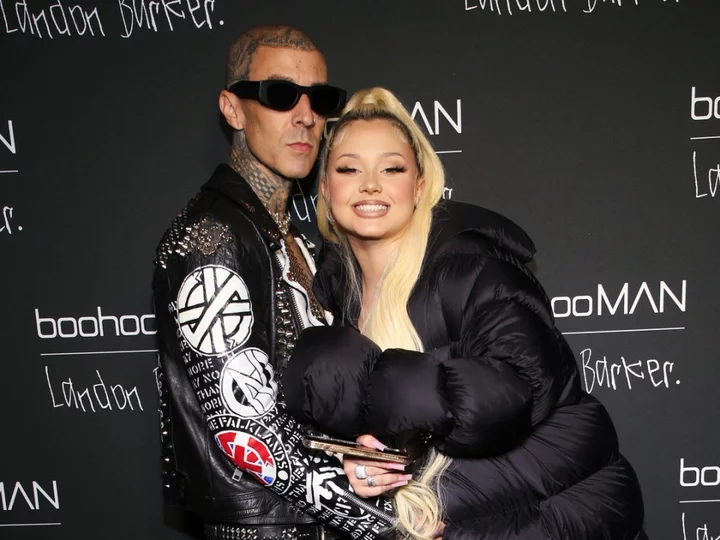
Alabama Barker shares struggle with autoimmune and thyroid disease amid body-shaming comments
Alabama Barker has revealed she struggles with an autoimmune and thyroid disease while addressing body-shaming comments about her weight. The youngest daughter of Blink-182 drummer Travis Barker hit out at body-shamers on TikTok after viral paparazzi photos led critics to refer to her as a “catfish”. The 17-year-old began her video by scowling at the camera, before she told her followers: “That’s my face when I see all the fake pages commenting about my weight in paparazzi pictures and saying I’m a catfish or saying I’m fat.” Barker went on to explain how “paparazzi will purposely take pictures” with “your mouth open, middle of sentence and any ugly picture they can get of you just for views”. “I would love to see you guys getting random pictures of you taken of you when you’re leaving the grocery store, in the middle of a sentence, with your mouth wide open - and let’s see how beautiful you look,” she said in the 20 August TikTok. She then revealed that fluctuations in her weight have been a result of her autoimmune and thyroid disease. According to Johns Hopkins Medicine, problems with the thyroid include a variety of disorders that can result in the gland producing too little thyroid hormone, called hypothyroidism, or too much thyroid hormone, called hyperthyroidism. Thyroid disorders can affect heart rate, mood, energy level, metabolism, bone health, and the body’s reaction to other hormones. “I also have a thyroid problem and an autoimmune disease, so that’s one of the main reasons why I have weight gain,” Barker said. “So, it would be very appreciated if you guys just keep your opinions to yourself. It will get you further in life.” The teen added that once her thyroid and autoimmune disease are “balanced,” she will go back to her “normal weight”. However, Barker emphasised that she’s only gained “five, 10 pounds” amid her health struggles, which she said is “so normal” for women. “I don’t want any girls that are young, watching this that are gaining weight to ever think there’s something wrong with it,” she continued. “There is a certain point when your health is getting affected by it that you need to change it, but, no. It’s not the case for me, and I would appreciate if you guys put yourself in my shoes.” @alabamabarker ♬ original sound - Alabama barker Since it was posted, Barker’s video has received more than 12m views and nearly two million likes. Many fans applauded Barker in the comments for opening up about her health struggles and shutting down body-shamers. “She’s so real with the thyroid comment because same,” one TikToker commented. “I have thyroid problems and an autoimmune disease too so I understand,” another fan wrote. “Weight really does fluctuate.” A third person said: “You are beautiful!! Stay strong!” Barker’s video comes after paparazzi snapped photos of the 17-year-old with her father, Travis Barker, and her pregnant step-mother, Kourtney Kardashian Barker. The Keeping Up with the Kardashians alum was seen sporting her growing baby bump, while Alabama was dressed in a graphic black T-shirt, black sweatpants, and an oversized hoodie. This is not the first time Barker has addressed negative social media comments. In April, she called out internet users who shamed her for wearing makeup, claiming that she was too young to wear a full glam. “When Kathryn with three kids only waterline liner, four different coloured blonde, and Tom shoes, talk about my makeup or age,” she captioned her TikTok video, which included the background audio: “I’ll tell you what you look like, but you won’t like it.” Alabama Barker is the youngest daughter of Travis Barker and Shanna Moakler. The former couple - who were married from 2004 to 2008 - share 19-year-old son Landon Barker as well. The drummer is also the adoptive father of Moakler’s oldest daughter, Atiana De La Hoya. Meanwhile, Travis and Kourtney revealed they were expecting their first child together last June. The reality star shares three children - Mason, 13, Penelope, 11, and Reign, eight - with ex Scott Disick. Barker and Kardashian tied the knot in May 2022. Read More Travis Barker discusses potential baby names for son with Kourtney Kardashian: ‘Even he knows it’s bad’ PrettyLittleThing advert banned for portraying 16-year-old Alabama Barker in a ‘sexual way’ Travis Barker praises Kourtney Kardashian for ‘healing’ him as he takes 30th flight following deadly crash
2023-08-23 00:25
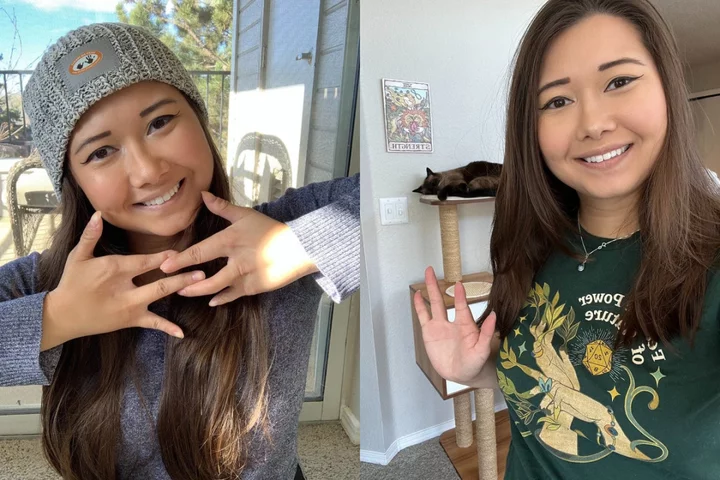
Woman with four digits ‘identified with Mickey Mouse growing up’ wants to be role model she never had
A 27-year-old woman with a rare genetic disorder who could only identify with Mickey Mouse while growing up due to the shape of the Disney character’s hands is trying to be the role model she never had as a social media influencer, to show people with disabilities they are “fully worthy and capable” of achieving anything. Rochelle Muir, who lives in Colorado, was born with ectrodactyly, which means she has three fingers and a thumb on each hand, two toes on her right foot, and four toes on her left foot. The condition causes difficulties in buying footwear, and with relationships – with one of her ex-boyfriends splitting up with her due to the possibility of their child being born with ectrodactyly – but she is now happily partnered with Charles, 31, a primary school counsellor who, along with her father Bill, is her “biggest cheerleader”. Rochelle, who is a client engagement manager for a healthcare company, could identify with characters such as Mickey Mouse growing up as he also has four digits, but she said “being like a cartoon is not exactly the role model you want”. She now posts pictures and videos on her social media platforms to educate others about ectrodactyly, raise awareness of the limb difference community, and share her hobbies, including gaming. “I remember specifically always loving the characters which had brown hair whenever they were in Barbie movies because I thought, ‘Oh, she’s like me!’,” she told PA Real Life. “But I never had that feeling when it came to my limb differences.” Rochelle has never let the disorder hold her back despite being teased and bullied at school, but when she entered the dating world in her 20s, she faced rejection multiple times and felt she was not “capable or worthy of having an amazing relationship”. “I’ve never been rejected over something that I couldn’t change about myself, something I was born with, and that was probably the first hit to my confidence with my limb differences where I felt awful about being born the way I am, about being disabled,” she said. “I just thought, I’m never going to find a meaningful relationship, I’m not worthy, I’m not capable, and that was the dialogue that kept going through my brain over and over again.” Rochelle has since removed “that nasty little voice out of (her) head”, found love with partner Charles, and shared her story publicly on social media, as she wants to “uplift” others among the disability community and show the world that “disabled is not a dirty word”. She said she is no longer “worried about showing (her) true self” and wants to encourage others to do the same. “Most people usually point out the negatives, but there are so many great positives with going and finding other people that look like you, other people you can connect with, and just creating this amazing community where you can uplift each other,” she said. “That’s one of the things I love about social media so much because when I came out about my limb differences, other people reached out and said, ‘Hey, I look exactly like you, this is so exciting, I’ve never seen anyone else that has the same hands as me’. “So it’s one of my favourite things now – and, yes, it’s sad that we didn’t have that growing up, but at least it’s there now and we can have that moving forward.” Ectrodactyly is a rare genetic disorder, and symptoms can vary, the National Organisation for Rare Disorders says. Rochelle underwent surgery to minimise the gap between her fingers and remove the longer toe on her right foot, enabling her to have improved grip and wear shoes from a young age. However, finding the right shoes has been an ongoing challenge and, when she was younger, she could not understand why she could not wear the same shoes as “able-bodied” people. “I remember specifically, there was a time, I think I was about five, that I tried to get my mum to buy me a pair of flip flops – they were pink, and they had butterflies and flowers on them,” she said. “My mum was so heartbroken because she couldn’t fully explain to me, ‘No, you can’t wear these shoes, they are going to be too dangerous for you’. “She eventually just caved and got me the shoes, and we were going up the escalator to go to the next floor in the mall, and I tripped, and we fell. “Ever since then, I’ve thought, I’m going to wear shoes that will stay securely on my feet.” Throughout her life, Rochelle has used humour to “defuse” awkward or uncomfortable situations and to enhance her confidence, but when it came to dating, for the first time in her life she felt self-conscious and “unworthy of having a real relationship”. She remembers one boyfriend who “was like a deer in the headlights” when he saw her feet for the first time, and another who ended the relationship over the possibility of their child being born with ectrodactyly. “He talked to his family, and his mum at the time said, ‘You need to decide whether you want to have kids because if you do, you have to break up with her’,” Rochelle explained. “The relationship ended, and I thought, I can’t blame him, but when I spoke to my friends, they said, ‘You’re amazing. What’s wrong with having a child with a limb difference?’ “That’s when I realised that I had internal ableism, where I told myself that having a disability is awful – ‘you’re not capable, you’re not worthy of having an amazing relationship’.” Ableism is discrimination in favour of able-bodied people – and it was at this point that Rochelle decided she wanted to do something about the lack of representation for people with ectrodactyly on social media. This “lit the fire” in her to share her story publicly for the first time, aged 25, and she has never looked back. Since then, she has launched her own Instagram, TikTok and YouTube channels on which she discusses ectrodactyly, limb differences and other disabilities, along with her hobby of gaming, and she has met Charles. Reading positive comments and messages, including from mothers of children who describe her as “an amazing role model”, has been “heart-warming” and makes her emotional – and she wants to continue to “fight ableism and bring more representation for the limb difference community”. “The biggest thing for me is representation for the limb difference community, but also for other disabilities as well, because the more we have that out there, the more of a norm it will be,” she said. “I want to be that role model, that person I wanted to look for in social media growing up, that person that younger me would be proud of and say, ‘Oh yeah, I know her, she’s so awesome, I’m just like her’. “It’s a younger me that inspires me to keep going forward and talking about these things, and I want to give the message that disabled is not a bad word, it’s not a dirty word, and you are fully worthy and capable of anything you put your mind to.” Find out more about Rochelle and her social media channels at beacons.ai/goodmornindreamer Read More Tempted to try barefoot running? Here’s what you need to know Can a vegan diet help with hot flashes in menopausal women? Why are wellbeing experts concerned about the ‘lazy girl job’ trend? Tempted to try barefoot running? Here’s what you need to know Can a vegan diet help with hot flashes in menopausal women? Why are wellbeing experts concerned about the ‘lazy girl job’ trend?
2023-08-22 22:23
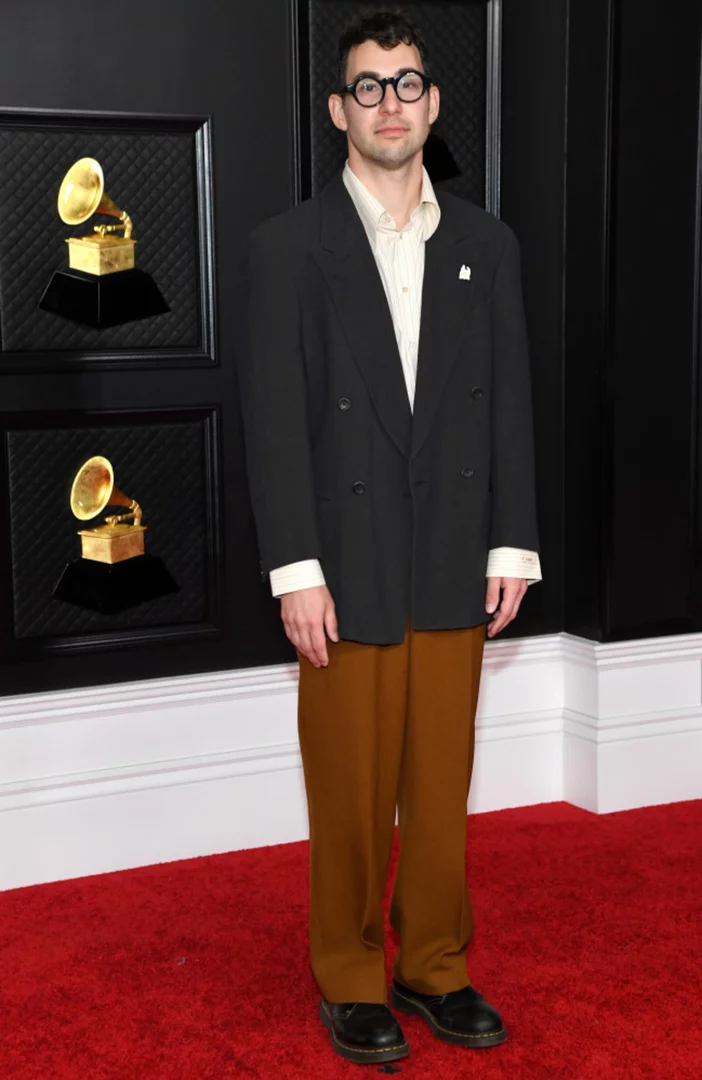
Jack Antonoff inks deals with The 1975's label Dirty Hit and Universal
Jack Antonoff is embarking on a new chapter of his music career with Dirty Hit and a publishing deal with Universal Music Publishing Group.
2023-08-22 19:29

Prostate screening ‘could save lives’ – the symptoms and risk factors you need to know
There are more than 47,000 men diagnosed with prostate cancer every year in England but new research says using MRI scans can reduce deaths caused by the disease. Current tests usually detect the level of the protein prostate-specific antigen (PSA) in the blood, but scientists say this has meant overdiagnosis and overtreatment of low-risk cancer. The Reimagine study, by University College London, University College London Hospitals NHS Foundation Trust and King’s College London, invited 303 men aged between 50 and 75 to have a screening MRI and a PSA test. Of those men, 48 (16%) had an MRI that indicated prostate cancer despite having a median PSA density – 32 of those had lower PSA levels than the current screening benchmark, meaning they would ordinarily not have been referred for investigation. After NHS assessment 29 were diagnosed with cancer that required treatment, and three were diagnosed with low-risk cancer with no need for treatment. Prof Caroline Moore, consultant surgeon at UCLH, chief investigator of the study and NIHR research professor, called the findings “sobering”. She said: “Our results give an early indication that MRI could offer a more reliable method of detecting potentially serious cancers early, with the added benefit that less than 1% of participants were ‘over-diagnosed’ with low-risk disease.” What is prostate cancer? Prostate cancer is the UK’s most common male cancer. It affects the prostate – a walnut-sized gland that sits beneath the bladder and surrounds the urethra in people born with male sex organs. Its main purpose is to help produce semen (the fluid that carries sperm). Prostate cancer can develop when cells in the prostate start to grow in an uncontrolled way. While some prostate cancers grow quickly and spread, others grow too slowly to cause any problems and therefore will never need any treatment. What are the risk factors “Prostate cancer is a disease we tend to see in older age groups (over-50s), but there are exceptions, as with any form of cancer,” said Dr Sanjay Mehta, GP at The London General Practice. According to Prostate Cancer UK black men are at a higher risk – one in four black men will get prostate cancer in their lifetime (compared to one in eight for other men). The risk increases after the age of 45. Family history is important too; your father or brother has had prostate cancer or your mother or sister has had breast cancer, your risk is higher. What are the symptoms? Often there aren’t any signs in the early stages, so be aware of your own risk factors and chat to your doctor if concerned. Prostate Cancer UK have an online risk checker you can use too. Mehta said to watch out for urinary symptoms and changes to how you urinate. “So frequency, where you need to go more often. Hesitancy, where you’re standing over the toilet bowl and a period of time will pass before you’re able to pass urine, and ‘dribbling’, where you’ve finished but find you’re still passing when you walk away. “These are common in older men anyway. But if it’s new for you, and you find you’re having to go more often at night, and you’re having hesitancy or urgency, see your doctor.” Other things to get checked include erectile dysfunction, blood in your urine, and any new and unexplained lower back pain. “Then there are general systemic symptoms, like lethargy, lack of appetite,” added Mehta. “Again, these things often happen anyway, but if it’s a change for you and it’s been happening for a couple of weeks, see your doctor.” How is prostate cancer diagnosed and treated? First, your doctor will chat through your symptoms and history with you. “The next step would involve an examination, including a rectal examination of the prostate,” said Mehta, before referral for further investigations. “I appreciate this can put some men off seeing their doctor but it is a very helpful way of assessing things”. After diagnosis, treatment depends on the stage of the cancer and what’s suitable for each individual, but it may include surgery or radiotherapy. Caught early, prostate cancer is generally very treatable. And even with advanced prostate cancer, treatments have come a long way. Read More Charity boss speaks out over ‘traumatic’ encounter with royal aide Ukraine war’s heaviest fight rages in east - follow live Keep fit to avoid heart rhythm disorder and stroke, study suggests How to give your home a proper summer sort out What you really need to do in autumn to keep your lawn in shape
2023-08-22 18:55
